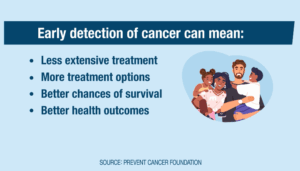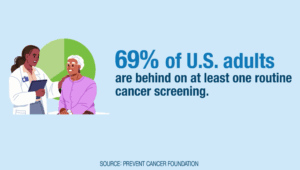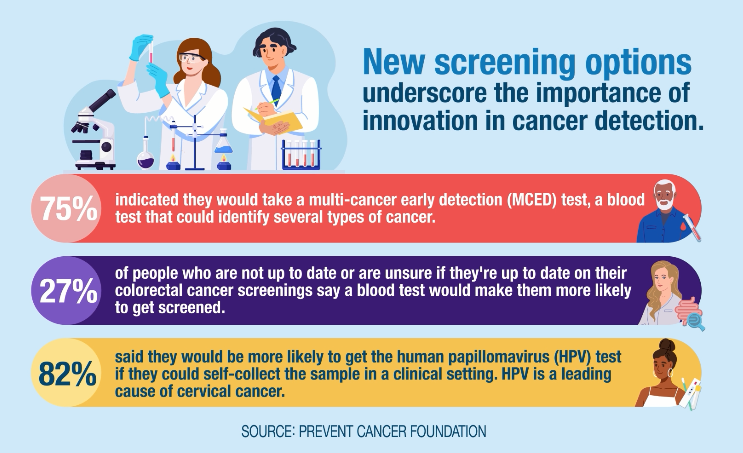Early Detection Saves Lives:
Your Guide to Cancer Screenings and Prevention
In today’s healthcare landscape, early detection stands as one of our most powerful tools in the battle against cancer. When diagnosed during its early stages, cancer is far more manageable and treatable – often resulting in better outcomes and improved quality of life. The Prevent Cancer Foundation has dedicated itself to empowering individuals with knowledge and actionable guidance about cancer screenings and preventative healthcare. This comprehensive guide will walk you through the rationale behind cancer screenings, the types available, and practical steps you can take to ensure you and your loved ones are proactive in your healthcare journey.
Understanding the Importance of Early Detection
 Nearly every form of cancer treatment is more effective if it is administered early. When cancer is identified in its nascent stages, the chance of successful treatment increases dramatically. Early detection not only saves lives but also improves the quality of life after treatment. By participating in routine screenings and following preventative measures, you can significantly reduce the risk of advanced disease, thereby preserving your well-being and that of your family.
Nearly every form of cancer treatment is more effective if it is administered early. When cancer is identified in its nascent stages, the chance of successful treatment increases dramatically. Early detection not only saves lives but also improves the quality of life after treatment. By participating in routine screenings and following preventative measures, you can significantly reduce the risk of advanced disease, thereby preserving your well-being and that of your family.
Key Benefits of Early Detection:
- Timely intervention and better treatment options
- Reduced treatment side effects and a less aggressive treatment plan
- Increased survival rates and improved long-term outcomes
- More informed lifestyle decisions leading to overall better health
Healthcare professionals recommend that everyone, regardless of age, should have an open dialogue with their doctor about cancer screenings.
If you’re at an increased risk due to familial or personal health history, discuss the screening options that are best suited for your situation.
Types of Cancer Screenings
There are various cancer screening tests available to detect signs of cancer well before symptoms appear. Knowing which screening applies to your age, gender, and risk factors is crucial. Some of the most common cancer screenings include:
1. Breast Cancer Screenings:
- Mammograms – Recommended for women typically over the age of 40.
- Ultrasound and MRI – Often used for those with denser breast tissue or a higher risk profile.
2. Cervical Cancer Screenings:
- Pap Tests – To detect precancerous or cancerous cells in the cervix
- HPV Tests – To identify the human papillomavirus which increases the risk for cervical cancer.
 3. Colorectal Cancer Screenings:
3. Colorectal Cancer Screenings:
- Colonoscopies – The gold standard for detecting colon cancer
- Fecal Occult Blood Tests – Non-invasive tests used periodically to monitor colon health
4. Prostate Cancer Screenings:
- PSA (Prostate-Specific Antigen) Blood Tests – Utilized to monitor prostate health in men
- Digital Rectal Exams – Often used in combination with blood tests for accurate diagnosis
5. Lung Cancer Screenings:
- Low-Dose Computed Tomography (LDCT) –
- Recommended for individuals with a history of heavy smoking who meet specific criteria
Each screening test is designed with the aim of detecting anomalies at a stage when interventions are most successful. Our healthcare experts urge you to consult your doctor about which screenings may be right for you based on your personal medical history.
What to Expect During a Screening
 Understanding what happens during a cancer screening can alleviate any concerns you might have about the process. Here’s what you can typically expect:
Understanding what happens during a cancer screening can alleviate any concerns you might have about the process. Here’s what you can typically expect:
- Pre-Screening Consultation: A healthcare provider will discuss your health history, family history, and any symptoms you may be experiencing. This conversation determines which screening is most appropriate for you.
- The Screening Process: Depending on the test, you might have blood drawn, undergo imaging (like a mammogram or CT scan), or have tissue sampling done. Modern techniques ensure these procedures are as comfortable and non-invasive as possible.
- Post-Screening Steps: Once the screening is complete, your provider will go over the results with you. In the event that any abnormalities are detected, further tests or monitoring may be recommended to ensure a comprehensive diagnosis.
Lifestyle Changes and Prevention Strategies
Prevention is always better than cure.
Beyond screenings, adopting a healthy lifestyle plays a pivotal role in reducing the overall risk of cancer.
Here are several preventative strategies that can be incorporated into your daily routine:
- Maintain a balanced diet rich in fruits, vegetables, whole grains, and lean proteins.
- Engage in regular physical activity tailored to your fitness level.
- Avoid or reduce alcohol consumption and refrain from tobacco use.
- Ensure regular medical check-ups and follow your doctor’s recommendations for screenings.
- Protect your skin from excessive sun exposure by using sunscreen and protective clothing.
Adopting such lifestyle changes is a cumulative process. Small adjustments, when coupled with routine screenings, offer robust protection against potential health issues, including cancer.
Understanding the Risk Factors
Not everyone faces the same risk levels when it comes to developing cancer. Several factors can increase your chances, and knowing these can help you make informed decisions about when and how often to be screened.
Some key risk factors include:
- Family History: A family history of certain types of cancer may increase your predisposition. A genetic counseling session might be recommended to understand your risks better.
- Age: The risk of cancer typically increases as you age, making periodic screenings even more critical for older adults.
- Lifestyle Factors: Habits such as smoking, excessive alcohol consumption, and a sedentary lifestyle can elevate cancer risk.
- Environmental Exposures: Exposure to harmful substances like radiation or industrial chemicals might make you more susceptible.
If you identify with any of the above risk factors, it’s important to reach out to your healthcare provider to tailor a screening schedule that fits your individual needs.
Call to Action: Schedule Your Screening Today
Taking the first step towards protecting your health has never been easier. We encourage you to schedule your cancer screening as soon as possible. Early detection not only empowers you but also allows healthcare providers to offer the most effective treatments at the earliest possible stage.
Here’s what you can do next:
- Consult your primary care physician about which screenings are right for you.
- Share this guide with family and friends—encouraging those you love to take proactive steps in preventing cancer.
By acting now, you take a crucial step towards enhanced wellness and a brighter future.
How to Prepare for Your Screening Appointment
Proper preparation can make your screening experience smoother and more comfortable. Consider these practical tips to ensure that you are well-prepared for your appointment:
 1. Gather Your Medical History:
1. Gather Your Medical History:
- Compile any previous test results or imaging studies.
- Make a list of any medications or supplements you are currently taking.
2. Dress Comfortably:
- Wear loose, comfortable clothing that is easy to remove or adjust if needed during the screening process.
3. Arrive Early:
- Give yourself ample time to check in and complete any necessary paperwork.
- This also allows time to fill out any forms about your medical history.
4. Ask Questions:
- Prepare a list of questions about the screening or any potential follow-up procedures.
- Don’t hesitate to request clarification on any steps in the process.
By following these tips, you help ensure that your screening appointment is as stress-free and informative as possible.
Frequently Asked Questions About Cancer Screenings
To further ease any apprehensions you might have, here are answers to some frequently asked questions related to cancer screenings:
- How often should I be screened? The frequency of screenings depends on the type of cancer, your age, family history, and other risk factors. Your doctor can assist in tailoring a screening schedule that is ideal for your health needs.
- Are cancer screenings painful? Most screening procedures are minimally invasive and cause little to no discomfort. Techniques and technology have evolved to make the process as gentle as possible.
- What if an abnormality is found? An abnormal screening result does not always indicate cancer. Your healthcare provider will guide you through additional tests or monitoring to confirm a diagnosis.
- Can lifestyle changes impact screening results? While lifestyle changes are crucial for overall health, they do not interfere with the screening process. In fact, a healthy lifestyle can support the treatment process should any issues be identified.
Encouraging a Culture of Preventative Healthcare
Preventative healthcare only works when individuals and communities come together to embrace healthy practices. By lowering the stigma associated with routine screenings and medical consultations, we create a more supportive environment for everyone.
It is important that families, workplaces, and communities advocate for regular screening programs as an extension of holistic wellness.
Ways to Encourage a Preventative Culture:
- Share experiences and success stories obtained from screenings.
- Organize local health fairs and community seminars where experts provide free consultations.
- Leverage social media to promote early detection awareness campaigns.
- Advocate for accessible screening services in underserved areas.
Final Thoughts: Empower Yourself Through Early Detection
 Cancer may be one of the most daunting health challenges of our time, yet the power of early detection continues to transform countless lives. The information provided in this guide is meant to empower you with the knowledge needed to make informed decisions about your health.
While the journey can sometimes seem overwhelming, remember that you are not alone. From medical professionals to support communities, many resources are available to ensure you receive the care you deserve.As you navigate the world of cancer prevention and early detection, keep in mind these key takeaways:
Cancer may be one of the most daunting health challenges of our time, yet the power of early detection continues to transform countless lives. The information provided in this guide is meant to empower you with the knowledge needed to make informed decisions about your health.
While the journey can sometimes seem overwhelming, remember that you are not alone. From medical professionals to support communities, many resources are available to ensure you receive the care you deserve.As you navigate the world of cancer prevention and early detection, keep in mind these key takeaways:- Regular screenings save lives—schedule them as advised.
- Embrace a lifestyle that champions balance, activity, and nutrition.
- Understand your personal risk factors by staying informed and proactive.
- Utilize modern technology and community support to remain on track.
Now is the time to take charge of your health. Whether you are scheduling your first screening or re-affirming your commitment to regular check-ups, know that every action you take is an investment in a healthier future.
Reach out today to schedule your screening and embark on a journey toward early detection and lasting wellness.
Call to Action – Protect Your Future: Get Screened Now!
Share this guide with friends and family to spread the word about the life-saving benefits of early detection.
Thank you for taking the time to learn about the power of cancer screenings and the preventative practices that can make a significant difference in your health.
Early detection truly saves lives—and your future could be brighter with each proactive step you take
Listen on Podcast
Did you like your experience?
Please leave us a Testimonial HERE if you have a Google account.
Your word helps get our word out to more people.
Thank you in advance!!



